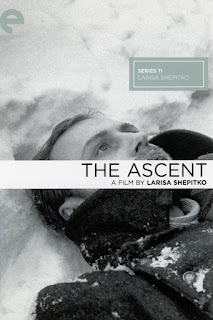That is the entire plot of The Ascent (1977), the final film of director Larisa Shepitko, who died two years later in a car accident. Like Wings, it is a stark, black-and-white drama, but instead of nestled twenty years after the Great Patriotic War, The Ascent is buried face first in the grueling conflict and misery of fighting and marching.
I don't if any other movie better captures the frigid cold and squalor of winter. This is not an adventurous, gung-ho war picture. There are a couple firefights with the Germans, but the biggest problems facing Sotnikov (Boris Plotnikov) and Rybak (Vladimir Gostyuhkin) are the freezing temperatures, lack of food and proper winter gear (the former doesn't have gloves), and the exhaustion.
The screen becomes so white at times, we can't tell where the sky begins and the ground starts, and our protagonists look like black specks against an overwhelming force of nature. Early on, Sotnikov is wounded in the leg, and the two men drag themselves across the frozen ground, snow coating their faces and soaking through their coats. In closeups, we see the ice clinging to their beards (screaming agony as Ian Anderson would say).
The closeup of the face is a favorite shot of Shepitko. Using harsh, naturalistic lighting (at times, the film feels like a documentary), we see the hard, sad faces of the characters and their sunken-in eyes, and many shots, especially of the increasingly despairing Sotnikov, are haunting in their bleakness. So much pain and suffering on the human face. No one looks glamorous. The film has a strong authentic streak, feeling real and harsh.
Curiously, Sheptiko elects to not show everything all the time. Several sequences have a limited, hunkered-down point of view, like the men's fight with a German patrol. The Germans remain far off in the distance, tiny scattering figures, but often, we stay behind a snow mound with the injured Sotnikov, and like him, we can only listen in tense anticipation as the enemy moves closer.
Later, the men stop in the cabin of Demchikha (Lyudmila Polyakova), a Russian woman with young children. She hides them in her attic when Germans approach. The camera lays in the straw with the men, the only view coming from a slit in the floor below. We listen as the figures below talk, only occasionally catching a glimpse as they walk across the opening, and we wonder when or if they're going to look up through it.
The second half of the movie shifts gears. The characters' trials move from the purely physical to the spiritual and emotional as the men are tempted with offers to betray their comrades as the men, plus Demchikha, are taken into captivity by the Germans and interrogated by a police collaborator, Portnov (Anatoly Solonitsyn), who despite never raising his voice or doing any physical himself (or even espousing any pro-Nazi beliefs) manages to be an utterly despicable, manipulative, and evil figure.
The Ascent moves slowly (and probably could have trimmed some minutes here and there), but it moves to a dark, bleak ending that raises two of the hardest questions about warfare: what is the price of survival, and is it worth it?
The Ascent suggests the price is one's soul. What you do to survive can never be washed away.




No comments:
Post a Comment